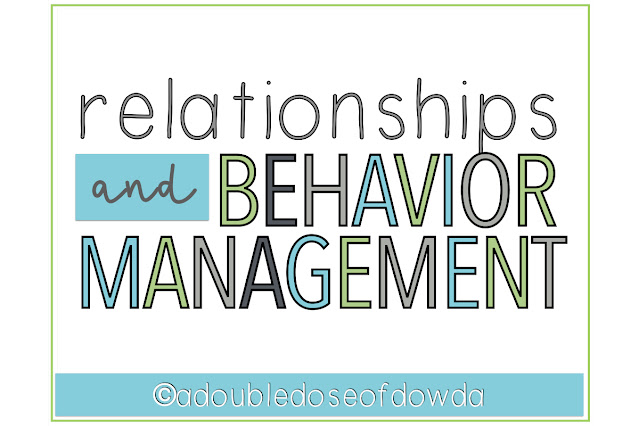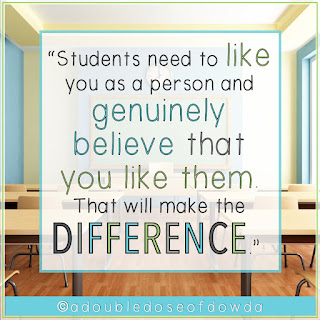Why does building relationships with students improve classroom management?
We share examples of the ways we can build meaningful relationships with our students, as well as the benefits we see in student behavior as a result of investing time in getting to know them and letting them know us. We aren’t just teaching content; we are teaching people.This post contains affiliate links. As an Amazon Associate, I earn from qualifying purchases. If you choose to purchase after clicking a link, I may receive a commission at no extra cost to you.
What to look for in this post:
Why should teachers build relationships with students?
How do you build relationships with students?
Getting to know your students
Being intentional about building relationships with challenging students
If you prefer to hear us talk through this, here is a video featuring all of this content:
[2:07] Why should teachers build relationships with students?
First, we want to address whether building relationships with students really makes a difference with behavior. In our experience, it absolutely does. When meeting a new group of students, building relationships should be your number one focus. Once you do that, they are so much more likely to like you and therefore to respect you. If they genuinely believe that you like them, it will make a difference.In the book, What Great Teachers Do Differently, Todd Whitaker talks about getting kids on your side. You aren’t their friend, but you do need to be likable in order for them to learn from you.
[3:21] How do you build relationships with students?
The second question we want to address is how teachers can build relationships with students. Early in your teaching career, it is common to try to be someone you aren’t - what you think a teacher is “supposed to be” like. You might think you need to put yourself on a pedestal in order to gain students’ respect. That’s no fun for you, or for the students! When you let your personality come through, you can form better connections with your students.You can call them nicknames (approved by them, always!). You can use humor, and you can goof around with your students. If you are having fun as a teacher, students are probably having fun too. You can share stories about your own life, especially if it is connected to what they are learning in the classroom. Kids like to get to know you, and they like to feel as though you are trusting them with your personal stories.
[6:57] Getting to know your students
It’s not just about sharing who you are with your students, it’s also about getting to know more about them. They love to engage in conversations about what they are doing, and what they like. You can learn a lot about your students by hearing about what they did over the weekend, and this information will help you to interact with them in the classroom.[7:47] Being intentional about building relationships with challenging students
We have all encountered students who we can tell are going to give us more of a challenge than the others. These are the students with whom you need to spend even more time and energy. Maybe they have a hard home life, or they are behind academically. You want to get as much face time with them as you can. Make it a point to talk to them as you circulate the room, and try to engage them in classroom discussions. Let them know that you are on their side.Sometimes we might see a kid walking down the hallway, and we can be quick to ask them where they are supposed to be or why they are not in class. Instead, we could approach them by asking if they are having a good morning or if we can help with anything. Frame things positively, and do not get into lecture mode. We do not want students to feel like we are watching them and waiting for them to mess up. Some research says that if you want to have a positive relationship with your students, they need at least three positive interactions for every negative interaction.
It can also be really helpful to hold parent/teacher conferences for challenging students. Once you hear the child’s story and know more about their background or how they live, you realize everything they are dealing with on a daily basis. Learning more about them is crucial in building relationships with these students, because having context makes it easier to empathize with them, have patience with them, and love them.
Building relationships with your students will not solve everything. It will, however, give you head start when it comes to behavior management in the classroom. If you start out with good relationships with your students, you can continue to build on those as the year goes on. Getting some early wins with your students will go a long way.
Looking for more classroom management resources?
The Classroom Management Behavior Plan is available on Teachers Pay Teachers.
Coaching Teachers on Behavior Management Strategies for the Classroom
4 Strategies for Elementary Classroom Management
Check out these related YouTube videos:
When Teachers Need Help with Behavior Management
4 Strategies for Elementary Classroom Management
Click here to access the Coaching for Classroom Management Guide FREEBIE:
https://view.flodesk.com/pages/5fc97dca132c2d4b127c9e00
Check out these related posts:Coaching Teachers on Behavior Management Strategies for the Classroom
4 Strategies for Elementary Classroom Management
Check out these related YouTube videos:
When Teachers Need Help with Behavior Management
4 Strategies for Elementary Classroom Management



No comments
Post a Comment